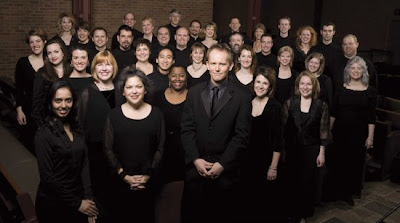
Bach’s St. Matthew Passion is one of the great masterpieces of Christian music; its music is sublime and inspiring, and its structure is one of its great strengths. Crowd reaction to Christ’s suffering is built into the telling of the story, and chorales in which the congregation is expected to participate, are also integral to the piece.
A few years ago, American composer David Lang appropriated this structure as the inspiration for a work of his own, The Little Match Girl Passion, based on the well-known story by Hans Christian Andersen. Conspirare’s superb Company of Voices recently gave the Austin premiere of this remarkable piece at St. Martin’s Lutheran Church.
As we have come to expect, Conspirare’s artistic director Craig Hella Johnson surrounded The Little Match Girl with music and words which complemented this major work.
The concert began with an excerpt from Bach’s St. Matthew Passion to clarify David Lang’s point of departure, and continued with a Requiem by the Sixteenth Century Spanish composer Tomás Luis de Victoria. This work by Victoria, while emotionally comforting in the face of death, also served to prepare us for the suffering and death of the poor little match girl.
After intermission we were transported to a world of suffering and hope through the imagination of Hans Christian Andersen and David Lang. Finally, as we tried to digest the sad fate of the little match girl and ponder its meaning, Conspirare send us into the night with a truly inspired choice of music, Carissimi’s Plorate, filii Israel (Weep, you children of Israel). This beautiful music manages to be both a lamentation and a celebration, enabling us to smile through our tears.
To be absolutely clear, David Lang’s The Little Match Girl Passion is not simply a setting of Andersen’s story. As Bach did in his Passions, Lang adds commentary in both words and music, using all manner of contemporary techniques. On the whole, the effect was extremely powerful; however, it must be said that even with a professional choir as strong as the Company of Voices, it was often difficult to follow the words – even with the text in front of us – as many of the words are broken up into constituent syllables, others are repeated many times, and there is frequent overlapping of text.
If Bach was the inspiration for what Lang is doing he was obviously not the model. In the Bach Passions, it is always perfectly clear what is going on because the Evangelist tells us in recitative-style that is very close to spoken word. In addition, the chorales were already familiar to the audience and so they could readily join in. The audience is not invited to join in Lang’s piece and would not have a clue what to do if it were.
Personally, I find a work such as Golijov’s La Pasión según San Marcos to be a much more vibrant and successful contemporary rethinking of Bach; nonetheless, Lang’s piece is serious, thoughtful and moving and deserves its success. It won the Pulitzer Prize for music in 2008.
For Conspirare’s 21-member Company of Voices, I have nothing but the greatest admiration. Each and every member made a distinguished contribution during the course of the evening, and the ensemble’s intonation and expressive control was exemplary.
Paul E. Robinson is the author of Herbert von Karajan: the Maestro as Superstar, and Sir Georg Solti: His Life and Music, both available at Amazon.com.















